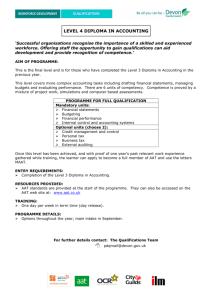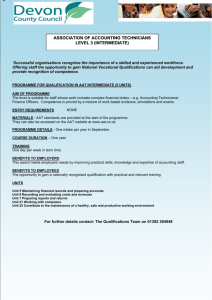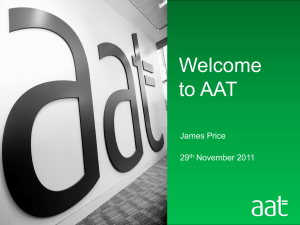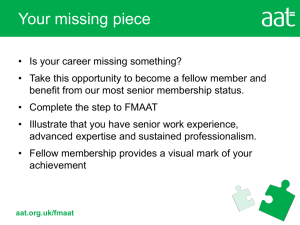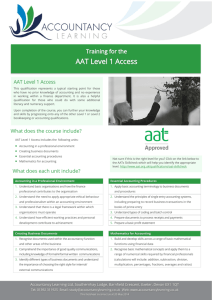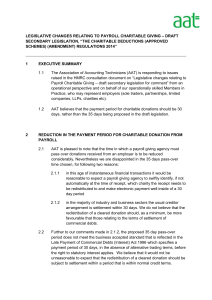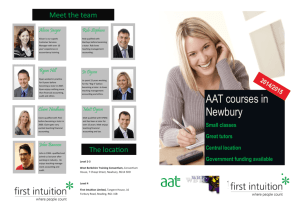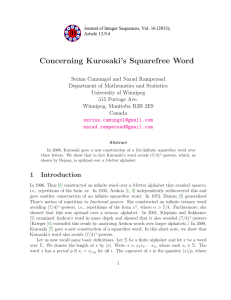An introduction to
advertisement
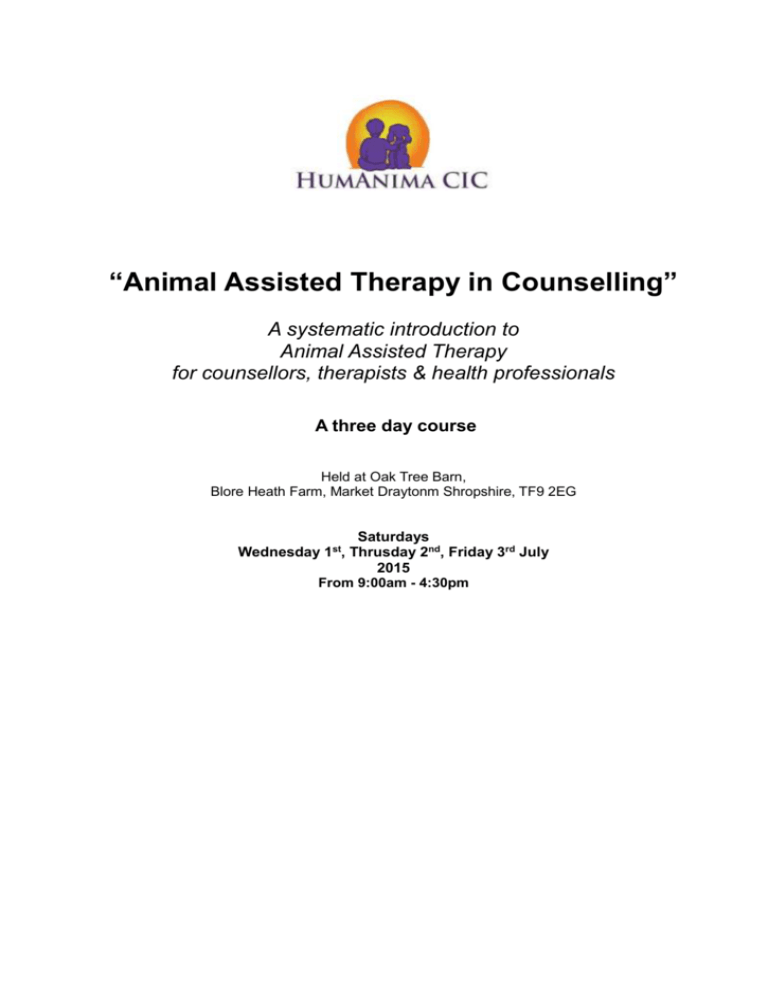
“Animal Assisted Therapy in Counselling” A systematic introduction to Animal Assisted Therapy for counsellors, therapists & health professionals A three day course Held at Oak Tree Barn, Blore Heath Farm, Market Draytonm Shropshire, TF9 2EG Saturdays Wednesday 1st, Thrusday 2nd, Friday 3rd July 2015 From 9:00am - 4:30pm Course details & Programme Course aims Anthrozoology (the study of the human-animal bond) is a relatively new academic field which is being increasingly explored and studied thanks to the growing body of evidence attesting to the relevance and benefits that can and have been gained from human-animal interactions. Animal Assisted Therapy (AAT) is just one of the many forms of Animal Assisted Interactions (AAI) that is being applied in a variety of health and social care settings to access, amongst others, the physical, psychological and emotional benefits than have been evidenced. AAT is most frequently56[ encountered in treatment settings for those with physical disabilities and learning disabilities. However, now there is a growing recognition of its potential application within psychotherapeutic, psychological and mental health treatment. How can we benefit from human-animal interactions? What is Animal Assisted Therapy in the context of psychotherapeutic practice? When is AAT in counselling suitable? How can it be applied ethically, safely and effectively for the benefit of our clients? Importantly, how can animal welfare be ensured and maintained? This workshop, based on the presenter’s personal interest, development and research over the last 9 years will help you to explore these questions and to discover techniques that can be applied within your counselling practice whilst working with animals directly and indirectly. In conjunction with existing research, I suggest that the therapeutic relationship can be developed more quickly and enhanced when incorporating AAT into your counselling practice. In addition, I will be looking to educate, inform and encourage you to cultivate your own relationship with animals safely not only for your own benefit, but for the animals’ benefit also. The course is open to experienced therapists/ counsellors working in any relevant therapeutic tradition and setting who want to learn how to incorporate working with animals through Animal Assisted Therapy (AAT) into their practice. Prior knowledge of companion animal behaviour and care would be beneficial. Indicative topics Personal development in counsellors’ / therapists’ awareness of human-animal interactions The definition of Animal Assisted Therapy (AAT) and principles involved Research perspectives in Animal Assisted Therapy (AAT) Therapeutic Strategies for working with animals in counselling and therapy Practical and ethical issues Course structure The course will be held over three days (One day a month for 3 months; from 9.30 – 4.00), during which participants will have an opportunity to consider AAT ideas and principles, share experiences, explore practical skills and incorporate them into their personal development and therapy work. The sessions will be a mix of theoretical and practical with reference to relevant research. Participants will also have the opportunity to meet and interact with a temperament assessed and qualified Therapy Dog, English Cocker Spaniel, Flossie. There will also be an opportunity to meet and interact with other therapy animals. Some of the exercises will help you to envisage and practice incorporating AAT into your counselling work - encouraging you to “think outside the box” and consider your own and your clients’ interaction with animals in a therapeutic manner. Homework tasks will be given in order to support & enhance participant’s learning experience. 2 Refreshments Refreshments and lunch are provided for the day and will include a variety of cold and warm foods that we anticipate and hope will be to your liking. As well as tea and coffee, there will be some fruit juices. If you have any special dietary requirements, please ensure you stipulate them on the booking form and notify Kathryn as soon as possible. The workshop leader Kathryn Kimbley has an MSc in Counselling Psychology and is a Person-Centred counsellor with interests in the human-animal bond, eco-therapy, care farming and Transpersonal Psychology. She has qualified with a Professional Certificate in Animal Assisted Therapy and a Foundation Certificate in Animals and Horticulture as Therapy and focused on “Counsellor Attitudes and Experiences Towards Incorporating Animal Assisted Therapy into Practice” for her Masters dissertation. Kathryn developed HumAnima CIC (www.humanima.co.uk), a West Midlands based social enterprise, with a view to providing a “more-than-profit” counselling service with the option of Animal Assisted Therapy for clients who wish to engage in this unique approach. HumAnima CIC is also able to design, establish and implement tailor-made, person-centred Animal Assisted Therapy programmes specific to client and organizational needs. Flossie, or Kimblekin Amber Magic is a 6yr old English Cocker Spaniel. She is a qualified Pets As Therapy dog who also took part with Kathryn in the Society For Companion Animal Studies’ (SCAS) “Practical Therapy Dog Training” course. She is also Kathryn’s cotherapist and most importantly, a beloved canine companion and confidant. About the venue Blore Heath Farm is host to “Green Age”, a not-for-profit social enterprise offering nature-based therapy. It has superb conference facilities in a newly-converted barn. Blore Heath Farm was built as part of the “model farm” movement in the late 1800’s and is on the site of Battle of Blore Heath 1459. The Green Age barns at Blore Heath – the meeting rooms. Blore Heath Farm enjoys a lovely setting on the Staffordshire / Shropshire/ Cheshire border, with distant views of the Welsh mountains. Set in 75 acres, it is a working farm with nativebreed sheep and cattle. There are ten acres of woodlands and conservation areas available for walking, nature projects or just quiet meditation. The newly-converted Green Age Barn is a purpose-built conference and training venue for up to 50 people with full disability access, wash room and kitchen facilities that looks out on the “Green Age Oak”. We will have a break in the morning and one in the afternoon and, of course, there will be lunch, during which time you can, stretch your legs and absorb what you’ve learnt. What to bring with you Weather permitting, you will be able to go outside for walks on the farm, so please bring wellies or boots and wet weather gear. You may wish to bring a camera to have a visual record of sessions. As Flossie & other animals will be present and we don’t know what the weather will be like we would suggest that you wear clothing that you don’t mind getting paw prints on – just in case! If you have any other queries, please don’t hesitate to contact us. You are welcome to bring a camera/ voice recorder and it is also recommended that you bring a notepad and pen although slides and resources will be provided at the end of the course. Certificate Participants attending will receive a Certificate of Attendance. The course is “credit-bearing” with 18 CPD hrs endorsed by the British Association for Counselling & Psychotherapy (BACP). Please note that this will show the teaching hours (contact hours) for the course as 18 hours. Fee The fee for the course is £349 for all three days which includes refreshments, lunch and detailed course notes and resource list. 4 Accommodation Accommodation is not included in the course fee. However, we are happy to help you find suitable accommodation and for those daring enough, you have the option to bring your own equipment and camp at the farm and enjoy Blore Heath's beautiful surroundings to the full! Booking Payment is required in full one month before the course start date. To book, please complete the booking form and return this to us along with your payment of £349 which can be made either: into HumAnima CIC’s Bank Account Directly (Santander Account Number: 45689583 Sort Code: 09-01-27) OR please send with cheque or Postal Order made payable to: “HumAnima CIC”, 67 Clark Road, Wolverhampton, West Midlands, WV3 9PA Please note that places are limited and will be allocated on a first-come, first-served basis. If you have special access or dietary requirements please indicate on your booking form. Policies HumAnima CIC is covered by public liability insurance, and complies with current health and safety legislation. Copies of policies, including our Cancellation Policy and Complaints Policy, are available on request. For more information Please contact: Kathryn Kimbley at info@humanima.co.uk Telephone: 07971933221 Cancellation Unavoidable circumstances may arise and you may cancel up to three weeks before the course for a full refund of the fee (we will return your cheque). After that, until one week before the first session, we reserve the right to refund less a 10% cancellation fee. Later cancellations cannot be refunded, nor can we refund subsequent non-attendance of the course day. Getting to Blore Heath Farm (“Green Age”) and the Oak Tree Barn Blore Heath Farm is located two miles east of Market Drayton, Shropshire along the A53. There are actually TWO “Blore Heath Farms” and one “Blore Farm” so be careful if setting your satnav (use TF9 2EG). If you get lost the phone number is 01630 653912 and they are the Hegarty family. Their farm is also known locally as “where the battle was”! Approaching via Loggerheads Take A53 into Loggerheads, following signs for Market Drayton - go straight on passing "The Loggerheads" pub on your left. Going through Loggerheads, zero your trip mileage recorder. At 1.90 miles or so the road enters a dip with a crossroads at the bottom. Stay on the road and, as you come out of this dip and round a left hand bend, note the approaching layby. Slow down, indicate left and turn left into Blore Heath Farm/Green Age/Oak Tree Barn as the layby ends. Go straight down the drive and see the buildings at the end. Approaching via Market Drayton The farm entrance is harder to see approaching from this direction. On the A53, about 1.7 miles from Market Drayton, note a road branching off left to Woore shortly followed by a minor road right turn to Almington. At this point you are 0.25 miles from the farm and you will see the farmhouse across the field to your right. Stay on the A53 and note the road is gently rising, At the “summit” of this, and as the road starts to go downhill again, start to indicate right and then you will see the Blore heath Farm /Oak Tree Barn/Green Age sign on your right. If you miss the turning, you can take the next left turn onto a minor road and then turn round to come back to the farm the other way. 6 “Animal Assisted Therapy in Counselling” Programme for Day 1 9:00 – 9:30am - Arrival & Registration 9:30 – 10:45am - Session 1: Introduction to Animal Assisted Therapy Definition and specific characteristics of AAT – differences between AAT & AAA History of AAT & areas of application/ fields Models of AAT & their role in counselling 10:45 – 11:00am - Break 11:00 – 1:00pm - Session 2: The Science behind the Bond/ Client groups & conditions 1:00 – 1:40pm - 1:40 – 3:10pm - Main theories linked to the HAI Bond – Biophilia Hypothesis, Mirror Neurons, Mere Exposure & Oxytocin AAT & different client groups Lunch Session 3: Animal behaviour & communication Transcending boundaries – human-animal communication What does my client need to know? 3:10 – 3:30pm - Break 3:30 – 4:30pm - Session 4: Animal Welfare, Care & H&S The Animal Welfare Act (2006) & “The Five Freedoms” Basic Animal Care & considerations Risk Assessments specific to HAI (these are as important for the therapy animal as for the therapist and client) Please note that the programme is flexible and subject to change. “Animal Assisted Therapy in Counselling” Programme for Day 2 9:00 – 9:30am - Arrival & Registration 9:30 – 10:45am - Session 1: How did you get on? Calming Signals Other AAI What is Animal Assisted Play Therapy? 10:45 – 11:00am - Break 11:00 – 1:00pm - Session 2: Introduction, Recap & AAPT AAT Techniques Basic Relational Techniques Parallels & Metaphors Storytelling Which techniques might be used for different conditions? 1:00 – 1:40pm - Lunch 1:40 – 3:10pm - Session 3: Suitability – What makes an animal suitable for AAT in Counselling? Interactive session with live animals Benefits of Human-Animal Interaction Suitable animals for AAT in Counselling – where do we draw the line? 3:10 – 3:30pm - Break 3:30 – 4:30pm - Session 4: Bringing it Together AAT & the Care Plan Case Study & Role Play Expressing emotions with AAT Measurement Please note that the programme is flexible and subject to change. 8 “Animal Assisted Therapy in Counselling” Programme for Day 3 9:00 – 9:30am - Arrival & Registration 9:30 – 10:45am - Session 1: How did you get on? Memory Box The Cycle of Abuse Other AAT Techniques 10:45 – 11:00am - Break 11:00 – 1:00pm - Session 2: Introduction, Recap & AAT Techniques Client groups, Conditions & Research Trauma, Touch & AAT AAT & Substance misuse Research Animals as Facilitators of the Core Conditions 1:00 – 1:40pm - Lunch 1:40 – 3:10pm - Session 3: The AAT-C Professional SCAS: AAI Code of Practice Plan, Prepare, Prevent, Propose – The Paper trail Supervision & AAT 3:10 – 3:30pm - Break 3:30 – 4:30pm - Session 4: Bringing it Together Outcome Measurement Promoting & Sharing Good Practice Close Please note that the programme is flexible and subject to change.
